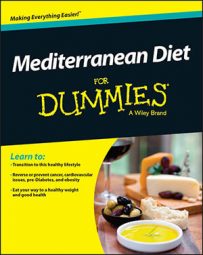Whether nuts, seeds, and legumes are the main event of a Mediterranean meal or a part of a snack or side dish, they’ll certainly complement your diet with a variety of nutrients and flavor. Here, you discover how these foods fit in with traditional Mediterranean fare and how to use them as a substitute for foods you’re currently eating.
You’ll also find out the right amount of servings to have each day. After all, you can have too much of a good thing.
Including nuts and seeds in your diet
Nuts and seeds are just one of the heart-healthy sources of fat encouraged on the Mediterranean diet (the other two are fatty fish and olive oil).
When you add nuts, seeds, and legumes into your Mediterranean diet, you can use them to replace other sources of calories you currently consume from artery-clogging saturated fat and refined carbohydrates.
The table gives you an idea of how your diet can be augmented for the better with nuts, seeds, and beans. This guide can help you improve your nutrient profile at various meals by reducing your intake of saturated fats and giving you more fiber. Use these substitutions as inspiration as you try to think of other ways to swap out less healthy ingredients for more healthy fare.
| Instead of This | Choose This | Nutrition Wins |
|---|---|---|
| Egg and cheese sandwich | Peanut butter sandwich | Lose 5 grams saturated fat Gain 2 grams fiber |
| Chicken noodle soup | Lentil soup | Gain 6 grams fiber |
| Caesar salad | Walnut and cranberry salad | Lose 5 grams saturated fat Gain 10 grams fiber |
| Chicken cutlet | Pistachio crusted salmon | Lose 3 grams saturated fat Gain 2 grams fiber |
| Mushroom risotto | Almond rice pilaf | Lose 5 grams saturated fat Gain 3 grams fiber |
Just like olive oil, nuts, and seeds are nutrient-dense: They give you a lot of nutrition in a small package. Although that is positive in many regards, it can also backfire if you don’t keep your portions in check.
Even if you are eating only nutritious foods but eating portions that are too large or eating too many servings, you can ingest too many calories and gain weight. Going overboard with nuts and seeds is easy because they’re so small, and the calories add up quickly.
When eating nuts and seeds, as a general rule, stick to 1 ounce per day, every day. Instead of eating directly out of a large container or mindlessly pouring nuts or seeds into a recipe, always portion out a serving for yourself.
| Nut | Quantity | Calories | Fat (grams) |
|---|---|---|---|
| Pistachios | 49 kernels | 160 | 13 |
| Almond | 23 nuts | 160 | 14 |
| Sesame seeds | 2 tablespoons | 160 | 14 |
| Hazelnuts | 21 kernels | 178 | 17 |
| Walnuts | 14 halves | 185 | 18.5 |
| Pine nuts | 167 kernels | 190 | 19 |
Source: Based on the USDA Nutrient Database
Adding legumes to your diet
Legumes are a great source of both protein and fiber, two nutrients that contribute to feeling satiated. (The full feeling lasts longer with protein and fiber because these two nutrients take the longest for your body to digest.) Legumes can also be a substitute for higher-in-saturated-fat proteins like meat or full-fat dairy. They can also be a substitute for starches, like refined grains.
You can’t really go wrong with any type of legume you add, from black beans to soy to lentil to cannellini (white kidney beans). Here are some Mediterranean favorites you can easily try at home:
Puree chickpeas and tahini into hummus for sandwiches or dip.
Add lentils to any type of salad, hot or cold.
Cook cannellini beans with chard, escarole, or spinach.
Add black beans to grain dishes, like quinoa or barley
Add cooked kidney beans to an omelet.
Make chili with a variety of legumes — any type you enjoy!
Most dried beans and peas, except for black-eyed peas and lentils, require soaking in water before cooking.

